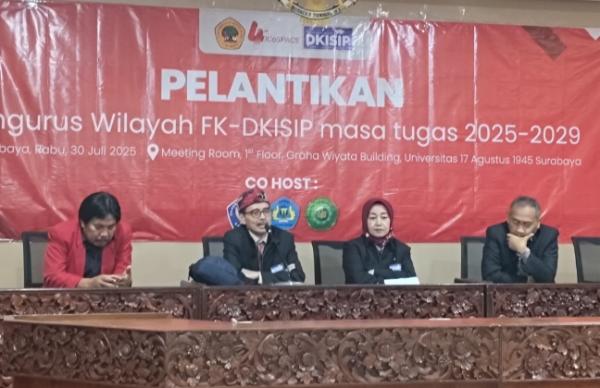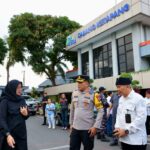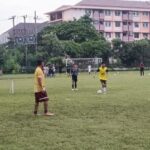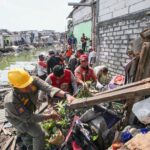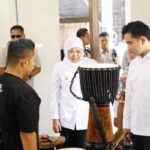In Indonesia, academia is currently under sharp scrutiny due to the rampant duplication and plagiarism issues. Not only students but also several lecturers have been implicated in unethical practices to attain the highest academic title: Professor.
This phenomenon has drawn serious attention from academics, including the Deans of Social and Political Sciences Faculties (FISIP) and Chairpersons of Social and Political Sciences Colleges (STISIP) across Indonesia (FK-DKISIP).
The Chair of FK-DKISIP emphasized that becoming a professor remains the ultimate goal for most university lecturers. Unfortunately, many are tempted to take shortcuts by using ghostwriting services or plagiarizing academic works.
“Becoming a professor is the dream of many lecturers. However, we are concerned that some still choose unethical methods. We can only remind them, not impose sanctions,” he stated during the opening of The 4th International Conference on Social, Politics, Administration and Communication Science (ICOSPACS) 2025, held from July 29–31, 2025, at Universitas 17 Agustus 1945 (Untag) Surabaya.
This prestigious event was organized by FK-DKISIP in collaboration with FISIP Untag Surabaya as the host. Under the theme “Nationalism Beyond Borders: Navigating Challenges of the Digital Era in Social and Political Sciences,” ICOSPACS 2025 emphasized the importance of integrity in academic publishing amid the challenges of the digital age.
The conference was not just a platform for presenting research but also a space for scholarly accountability. Every submitted paper had to be based on authentic research—whether fieldwork or literature studies—and checked using plagiarism detection tools like Turnitin, with a maximum similarity threshold of 25%.
“We want to ensure that all published works are original. Lecturers must write before their ideas are claimed by others,” stressed the Chair.
A total of 96 academic papers were presented at the conference, with participants from 55 higher education institutions across Indonesia. Of these, 58 attended virtually, while 38 were present in person at Untag Surabaya. In addition to lecturers, the event was attended by students, practitioners, public officials, and business professionals.
One of the key outputs of the conference was publication in the form of e-book proceedings, nationally accredited SINTA 2–4 journals, and reputable international journals indexed by Scopus.
The Chair of the Organizing Committee added that ICOSPACS plays a crucial role as a platform for collaboration and expanding academic networks across disciplines and institutions.
“We hope that in the future, this conference will attract not only academics but also more practitioners and policymakers. The culture of research and writing should expand across all sectors,” he said.
Untag Surabaya
“Untag Surabaya” refers to the *Universitas 17 Agustus 1945 Surabaya* (August 17, 1945 University of Surabaya), a prominent private university in Surabaya, Indonesia. Established in 1958, it was founded to honor Indonesia’s independence day (August 17, 1945) and plays a key role in higher education, particularly in law, economics, and engineering. The campus is known for its academic contributions and historical ties to Indonesia’s post-independence era.
FISIP
FISIP (Fakultas Ilmu Sosial dan Ilmu Politik) is the Faculty of Social and Political Sciences at the University of Indonesia (UI), one of Indonesia’s most prestigious universities. Established in the 1950s, FISIP is known for its academic excellence in social and political sciences, contributing significantly to research, policy-making, and leadership in Indonesia. The faculty offers programs in sociology, political science, communication studies, and more, shaping future experts and leaders in these fields.
STISIP
STISIP (Sekolah Tinggi Ilmu Sosial dan Ilmu Politik) is an Indonesian higher education institution specializing in social and political sciences. Established to advance knowledge in governance, public policy, and social studies, it plays a key role in training future leaders and professionals in these fields. While specific founding dates vary by campus, such institutions emerged prominently in Indonesia during the late 20th century to support national development.
FK-DKISIP
It appears that “FK-DKISIP” is not a widely recognized place or cultural site, and there is limited available information about it. If you have additional details or context—such as its location, significance, or correct spelling—please provide them so I can offer a more accurate summary. Alternatively, it might refer to an acronym or a lesser-known local site that requires further clarification.
ICOSPACS
ICOPACS (Integrated Central Online Public Access Catalog System) is a digital library management system used to organize and provide access to academic and research materials. While not a physical cultural site, it plays a key role in preserving and disseminating knowledge, particularly in educational institutions. Its development reflects the shift from traditional card catalogs to modern digital databases, improving efficiency in resource sharing and information retrieval.
Universitas 17 Agustus 1945
Universitas 17 Agustus 1945 (UNTAG) is an Indonesian university established on July 17, 1958, in Surabaya, named in honor of Indonesia’s independence day (August 17, 1945). Founded to support national education and development, it has expanded to multiple campuses across Indonesia, offering diverse academic programs. The university reflects Indonesia’s post-independence commitment to higher education and national progress.
Turnitin
Turnitin is an online plagiarism detection service used by educational institutions to check students’ submissions for originality. Founded in 1998, it compares texts against a vast database of academic papers, websites, and other sources to identify potential unoriginal content. While widely used, it has faced criticism over privacy concerns and its handling of student work.
SINTA
There is no widely recognized cultural or historical site known as “SINTA.” If you are referring to a specific place, it may be a local or lesser-known location, or there may be a spelling error. For example, “Sinta” could be a misspelling of *Sinta River* in the Philippines or a reference to *Sinta*, a character in Philippine folklore.
If you meant a different site, please provide additional details or clarify the name for a more accurate summary.

